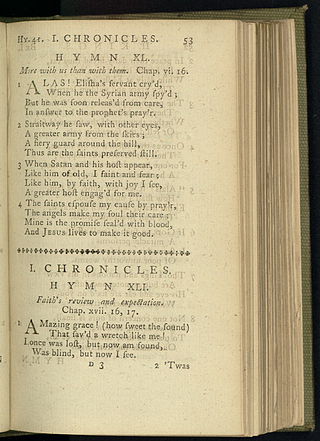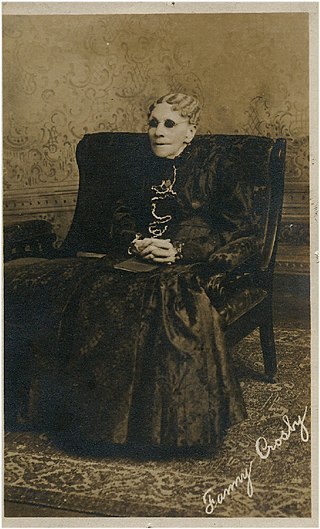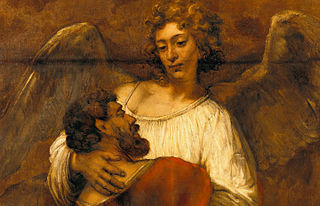
"Amazing Grace" is a Christian hymn published in 1779, written in 1772 by English Anglican clergyman and poet John Newton (1725–1807). It is an immensely popular hymn, particularly in the United States, where it is used for both religious and secular purposes.
A doxology is a short hymn of praises to God in various forms of Christian worship, often added to the end of canticles, psalms, and hymns. The tradition derives from a similar practice in the Jewish synagogue, where some version of the Kaddish serves to terminate each section of the service.

Ira David Sankey was an American gospel singer and composer, known for his long association with Dwight L. Moody in a series of religious revival campaigns in America and Britain during the closing decades of the 19th century. Sankey was a pioneer in the introduction of a musical style that influenced church services and evangelical campaigns for generations, and the hymns that he wrote or popularized continued to be sung well into the 21st century.

"Love Divine, All Loves Excelling" is a Christian hymn by Charles Wesley on Christian perfection. Judging by general repute, it is among Wesley's finest. Judging by its distribution, it is also among his most successful.

Frances Jane van Alstyne, more commonly known as Fanny J. Crosby, was an American mission worker, poet, lyricist, and composer. She was a prolific hymnist, writing more than 8,000 hymns and gospel songs, with more than 100 million copies printed. She is also known for her teaching and her rescue mission work. By the end of the 19th century, she was a household name.

The camp meeting is a form of Protestant Christian religious service originating in England and Scotland as an evangelical event in association with the communion season. It was held for worship, preaching and communion on the American frontier during the Second Great Awakening of the early 19th century. Revivals and camp meetings continued to be held by various denominations, and in some areas of the mid-Atlantic, led to the development of seasonal cottages for meetings.

"O for a Thousand Tongues to Sing" is a Christian hymn written by Charles Wesley. The hymn was placed first in John Wesley's A Collection of Hymns for the People Called Methodists published in 1780. It was the first hymn in every (Wesleyan) Methodist hymnal from that time until the publication of Hymns and Psalms in 1983.
Cwm Rhondda is a popular hymn tune written by John Hughes (1873–1932) in 1907. The name is taken from the Welsh name for the Rhondda Valley.

"Blessed Assurance" is a well-known Christian hymn. The lyrics were written in 1873 by blind hymn writer Fanny Crosby to the music written in 1873 by Phoebe Knapp.

Robert Lowry was an American preacher who became a popular writer of gospel music in the mid-to-late 19th century. His best-known hymns include "Shall We Gather at the River", "Christ Arose!", "How Can I Keep from Singing?" and "Nothing But The Blood Of Jesus".

"Just as I Am" is a Christian hymn, written by Charlotte Elliott in 1835, first appearing in the Christian Remembrancer, of which Elliott became the editor in 1836. The final verse is taken from Elliott's Hours of Sorrow Cheered and Comforted (1836).

A Christian child's prayer is Christian prayer recited primarily by children that is typically short, rhyming, or has a memorable tune. It is usually said before bedtime, to give thanks for a meal, or as a nursery rhyme. Many of these prayers are either quotes from the Bible, or set traditional texts.

("Give Me That") "Old-Time Religion" is a traditional Gospel song dating from 1873, when it was included in a list of Jubilee songs, or earlier. It has become a standard in many Protestant hymnals, though it says nothing about Jesus or the gospel, and covered by many artists. Some scholars, such as Forrest Mason McCann, have asserted the possibility of an earlier stage of evolution of the song, in that "the tune may go back to English folk origins". In any event, it was by way of Charles Davis Tillman that the song had incalculable influence on the confluence of black spiritual and white gospel song traditions in forming the genre now known as southern gospel. Tillman was largely responsible for publishing the song into the repertoire of white audiences. It was first heard sung by African-Americans and written down by Tillman when he attended a camp meeting in Lexington, South Carolina in 1889. Popular versions of the song were recorded in the 1950s by singers including Tennessee Ernie Ford and Jim Reeves.
"Gwahoddiad" is a Welsh hymn of American origin.

Rev. Richard Jukes (1804–1867) was a popular Primitive Methodist minister and hymn writer. This article provides a brief biography, and a summary of his work as a popular minister and hymn writer during the first half-century of Primitive Methodism.

Jacob Knapp was a popular Baptist preacher of the 19th-century United States.

"Wrestling Jacob", also known by its incipit, "Come, O thou Traveller unknown", is a Christian hymn written by Methodist hymn writer Charles Wesley. It is based on the biblical account of Jacob wrestling with an angel, from Genesis 32:24-32, with Wesley interpreting this as an analogy for Christian conversion. First published in 1742, it has been included in every Methodist hymnbook since 1780. In its original form, it had fourteen stanzas, but it is rarely sung in its entirety. The hymn is commonly described as one of Charles Wesley's greatest compositions, with the hymn writer Isaac Watts quoted as saying that "that single poem, Wrestling Jacob, was worth all the verses he himself had written".

"Down in the River to Pray" is a traditional American song variously described as a Christian folk hymn, an African-American spiritual, an Appalachian song, and a Southern gospel song. The exact origin of the song is unknown. The most famous version, featured in O Brother Where Art Thou?, uses a pentatonic scale, common in many African American spirituals.

Martin Wells Knapp (1853–1901) was an American Methodist minister who founded several institutions including the magazine God’s Revivalist in 1888, the International Holiness Union and Prayer League in 1897, and God's Bible School, later known as God's Bible School and College, in Cincinnati, Ohio in 1900. He was a central figure of the more radical wing of the Holiness movement.















